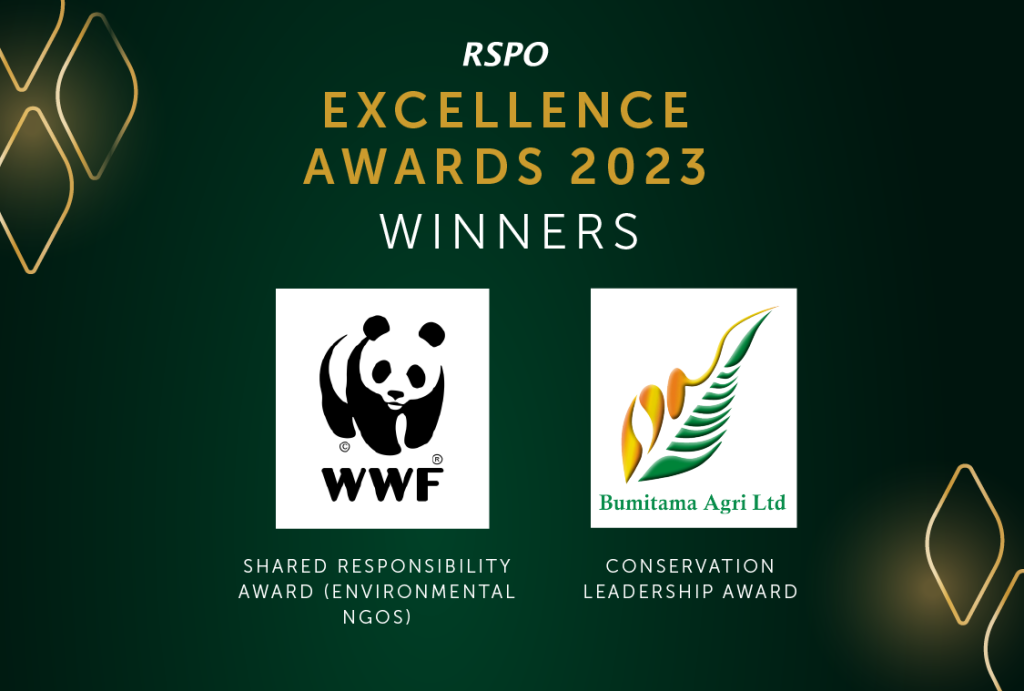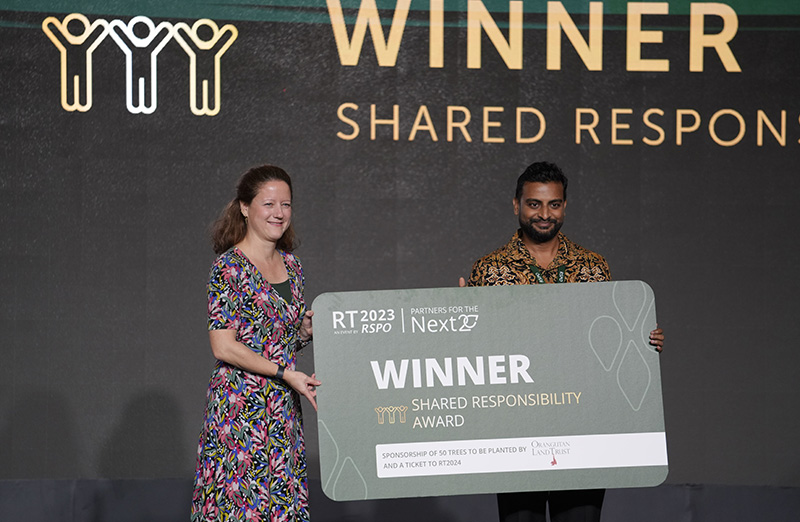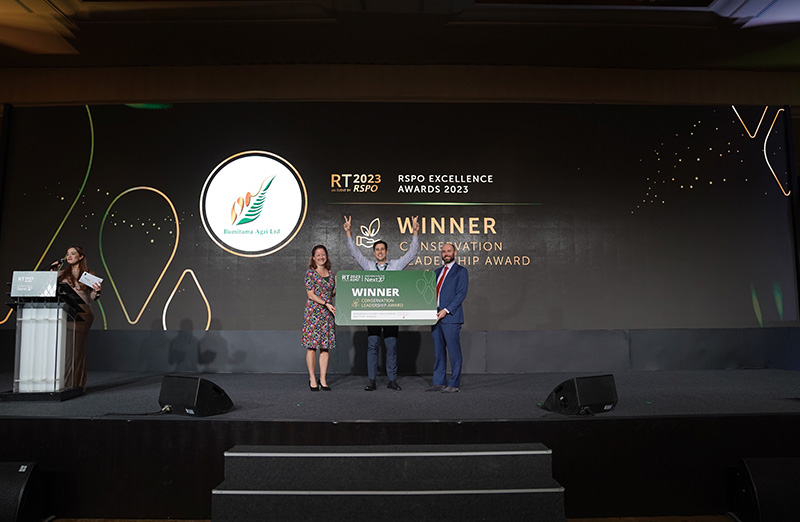
In this second instalment of our special interview with RT2023 Excellence Awards winners, we caught up with WWF International and Bumitama Agri Ltd. to get their insights into specific challenges and success factors in their winning programmes, embodying the passion and innovation that are moving the sustainable palm oil industry forward.

Holistic Approach: Navigating the Palm Oil Value Chain for Sustainable Impact
Shared Responsibility Award (Environmental NGOs): WWF International
Programme: Asia Sustainable Palm Oil Links Programme (ASPOL)
Could you tell us about your project’s “whole value chain” approach?
Asia Palm Oil Links Programme (ASPOL) aims to halt palm oil-driven deforestation in major Asian countries, including Indonesia, Malaysia, Singapore, China, and India. Our comprehensive approach focuses on sustainable production, trade, and consumption. We collaborate with governments for national and regional policy improvements, promote jurisdictional certification, and assist small growers in achieving RSPO Certification.
To enhance sustainable trade, we’re developing a traceability app and advising major traders on implementing sustainability commitments. In terms of consumption, we urge companies to adopt certified sustainable palm oil, raise awareness among consumers, and advocate for stronger sustainability requirements in government policies. Additionally, we’re dedicated to enhancing the capacity of financial institutions in identifying and mitigating ESG risks related to palm oil financing, fostering concrete actions for deforestation-free supply chains.
What have been the main successes in facilitating the project across multiple producing countries?
Our efforts include training nearly 4,000 smallholders in sustainable agricultural practices. We have also assisted 100 of them in obtaining RSPO Certification, showcasing a tangible positive impact on the ground and fostering a more sustainable approach to palm oil production.
Seeing improvements in the sustainability policies and practices of 56 out of the 245 companies we have engaged with is a significant achievement for us – this indicates a positive response from the corporate sector toward adopting more sustainable practices in the palm oil industry.
Additionally, we’ve successfully reached over 27 million consumers through various campaigns, shaping awareness and preferences for sustainable palm oil. Finally, the inclusion of financial institutions in the project is a strategic move, recognising their influential role in creating a more sustainable financial ecosystem that can better serve the palm oil industry.
What is the next phase of your programme? Any other goals or aspirations you would like to see through over the coming years?
We aim to deepen engagements in current focus countries to further promote sustainable practices, and potentially expand initiatives to other key palm oil-producing regions globally. We will be intensifying efforts to advocate for stronger sustainability policies and regulations at national and regional levels through collaboration with governments and industry. Through consumer engagement, we hope to continue to encourage sustainable choices and support corporate uptake of certified palm oil. Support for small and medium growers to achieve certification will expand through training programmes and ongoing assistance. We are also exploring bankable solutions by collaborating with financial institutions to design instruments and funding mechanisms that incentivise and finance sustainable palm oil initiatives.

Green Symphony: Orchestrating Sustainability in Agriculture and Communities
Conservation Leadership Award: Bumitama Agri Ltd
Bumitama Biodiversity and Community Programme (BBCP)
What distinguishes the Bumitama Biodiversity and Community Programme (BBCP) as a sustainable model, and how could it reshape our approach to agriculture, biodiversity, and community resilience?
The programme’s uniqueness lies in Bumitama’s holistic commitment, encompassing financial, human, and long-term strategic resources, with adaptability to changing scenarios. Its success is bolstered by the integration of conservation areas with plantation operations, viewing these areas as essential for environmental health and community wellbeing. A transformative element of BBCP is its focus on raising awareness, building capacity, and driving attitudinal changes towards environmental stewardship. The programme establishes a common goal for sustainable conservation through collaboration with stakeholders in forums like Production, Protection, Inclusion (PPI) of Ketapang region and the Kawasan Ekosistem Esensial (KKE) of West Kalimantan province, promoting collaboration, advocating for supportive policies, and aligning interests for better conservation management.
How has BBCP’s community involvement transformed local residents’ relationship with the environment and influenced sustainable living practices?
BBCP has transformed community-environment dynamics by actively managing conservation areas, turning them into recognised, protected zones. Legal frameworks like the KEE Decree and the Regional Secretary (Sekda) of the Ketapang Regent reinforce the importance of these areas in ecosystem preservation. Communities now practise responsible land conversion, reducing destructive methods and illegal activities. This shift, along with decreased poaching, showcases the effectiveness of the programme.
Former illegal loggers and poachers now contribute to reforestation, signalling a significant change in livelihoods and mindsets. Participatory management, prioritising community access and use rights, is crucial in conservation planning. Involving stakeholders from the early stages has integrated local communities into natural resource management, promoting sustainable living practices.
Looking forward to 2024 and beyond, what are the aspirations and future plans for
the BBCP?
We envision broadening stakeholder involvement to include universities, NGOs, and local governments. The establishment of a Field School and training centre is underway to empower smallholders, increase productivity, and promote sustainable plantation practices. The project’s scope is expanding to include the co-management of village forests, thereby scaling up its conservation impact within the larger landscape. These future endeavours are geared towards continuing BBCP’s profound impact on sustainability and biodiversity conservation, reinforcing its role as a blueprint for harmonious coexistence between human activities and the natural environment.
Keep reading

Book Your Slot for the Additional prisma Clinic Session at RT2025

Advancing Jurisdictional Certification in Sabah: Strengthening Collaboration Between RSPO, UNDP, and Jurisdictional Approach System for Palm Oil (JASPO)
Call for Expression of Interest: Independent Investigation of a Complaint

Leading Labels: RSPO Among Top Sustainability Labels in Dutch Market

The 21st International Oil Palm Conference Successfully Took Place in Cartagena, Colombia

Top Performers of the 2025 Shared Responsibility Scorecard

ACOP 2024: RSPO Market Trends Resilient Despite Global Challenges

RSPO: Actions for the Certification of Sustainable Palm Oil Production




